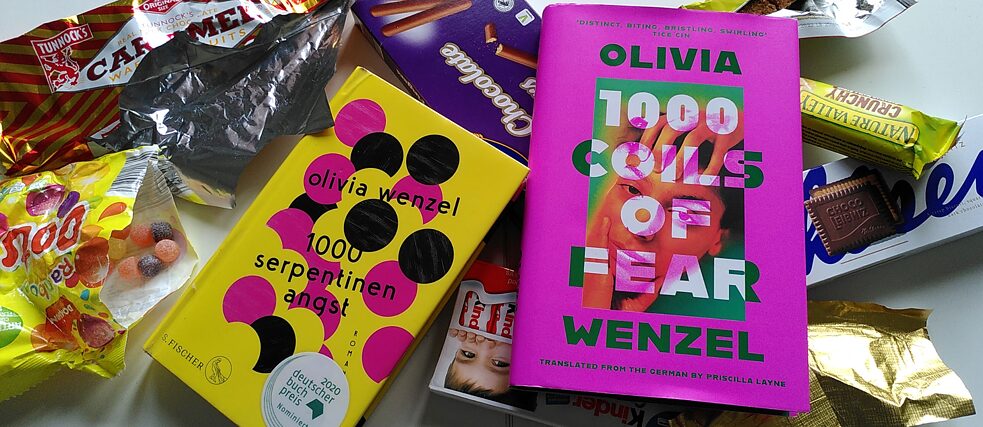December 2022
Olivia Wenzel: 1000 Coils of Fear

Olivia Wenzel's debut novel is reminiscent in parts of the best of Jeanette Winterson.
Roughly a year ago, when I was making plans for this blog for 2022, I realised with a shock how overwhelmingly white the authors I had covered up until that point had been. I normally make a conscious effort to platform minoritised voices across my work, and honestly, I was pretty appalled. As I started asking colleagues for recommendations for more diverse books to review, I realised the blame didn’t only lie with myself: remarkably few authors of colour had been translated from German to English. The politics of who gets translated often magnifies structural inequalities in the publishing world and society more broadly, and this particular instance was no different.
Luckily though, the past year has seen a significant shift on this front, with a number of fantastic German authors of colour finding publishers in the UK – including my top three reads of 2022: Mithu Sanyal’s Identitti, Shida Bazyar’s Sisters in Arms (out next year in a translation by Ruth Martin) and Olivia Wenzel’s 1000 Coils of Fear. All three are amongst the most innovative, challenging and engaging books I’ve read in the last few years, and bring English-language readers a really exciting perspective on contemporary German literature – a far cry from the books by earnest young white men about earnest young white men which sometimes dominate Germany’s book review pages.
Most recently, I read Wenzel’s 1000 Coils of Fear (tr. Priscilla Layne). The novel follows a young woman from East Germany over a couple of years, as she tries to come to terms with both the death of her brother and the racism she faces on a daily basis. Her off-the-grid white German mum and her Angolan father, who gets in touch sporadically via Facebook, are not much help.
Wenzel’s depiction of anxiety (like living in “a permanent case of emergency”) is immediate and heart-wrenching, while her awareness of often being the only person of colour in any situation really communicates a sense of vigilance and unease to the reader. And yet this is also a book with a lot of compassion and a lot of humour. Wenzel has an eye for the absurdities of human interactions, which often have a shock moment of recognition for the reader – at one point, the narrator stops volunteering with refugees out of sheer awkwardness: “SORRY, PEOPLE! I’M SO MORALLY SUBLIME THAT I CAN’T HELP YOU: BYEEE—SEE YOU NEVER!”
Over the course of the novel, Wenzel switches between a number of different formats, and combined with her use of the fantastic to reflect on loss and trauma, and the way this grows the emotional breadth of the novel, this reminded me of my favourite of Jeanette Winterson’s works. The novel shifts from fairly straightforward novelistic prose, to beautifully fantastical prose poems, to dialogues between a “you” and an “I” which almost seem like interrogations – echoing the narrator’s presumed experience at passport control near the start of the book, and her interactions with her therapist later on – but also shifting in tone (argumentative, helpful, challenging) as her own sense of self-awareness grows and changes. Despite the first person narrator, this is a book of many voices, and Wenzel’s background as a playwright shines through.
I often find myself explaining to people that programming diversity is about both ethics and quality; representation and inclusion are important in and of themselves, but they’re also necessary if we want to make sure we’re hearing the best voices, the best stories that are out there. 1000 Coils of Fear absolutely proves that point.
About the author
Annie Rutherford makes things with words and champions translated literature in all its guises. A writer, translator and events organiser, she's currently researching the possibility of setting up a Writers in Exile residency in Edinburgh, and also runs Lighthouse Bookshop's Women in Translation book group. She can spot a misplaced apostrophe at a distance of fifty yards.Reserve the original German title of 1000 Serpentinen Angst in our Glasgow library.
E-Library: Borrow the original German title of 1000 Serpentinen Angst digitally.
Find out more about the blog.
Book Blog Overview